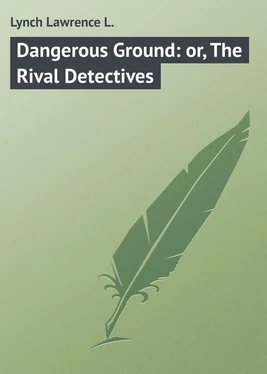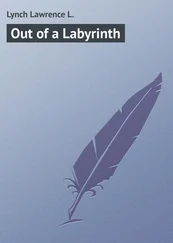Lawrence Lynch - Dangerous Ground - or, The Rival Detectives
Здесь есть возможность читать онлайн «Lawrence Lynch - Dangerous Ground - or, The Rival Detectives» — ознакомительный отрывок электронной книги совершенно бесплатно, а после прочтения отрывка купить полную версию. В некоторых случаях можно слушать аудио, скачать через торрент в формате fb2 и присутствует краткое содержание. Жанр: foreign_prose, на английском языке. Описание произведения, (предисловие) а так же отзывы посетителей доступны на портале библиотеки ЛибКат.
- Название:Dangerous Ground: or, The Rival Detectives
- Автор:
- Жанр:
- Год:неизвестен
- ISBN:нет данных
- Рейтинг книги:4 / 5. Голосов: 1
-
Избранное:Добавить в избранное
- Отзывы:
-
Ваша оценка:
- 80
- 1
- 2
- 3
- 4
- 5
Dangerous Ground: or, The Rival Detectives: краткое содержание, описание и аннотация
Предлагаем к чтению аннотацию, описание, краткое содержание или предисловие (зависит от того, что написал сам автор книги «Dangerous Ground: or, The Rival Detectives»). Если вы не нашли необходимую информацию о книге — напишите в комментариях, мы постараемся отыскать её.
Dangerous Ground: or, The Rival Detectives — читать онлайн ознакомительный отрывок
Ниже представлен текст книги, разбитый по страницам. Система сохранения места последней прочитанной страницы, позволяет с удобством читать онлайн бесплатно книгу «Dangerous Ground: or, The Rival Detectives», без необходимости каждый раз заново искать на чём Вы остановились. Поставьте закладку, и сможете в любой момент перейти на страницу, на которой закончили чтение.
Интервал:
Закладка:
He threw back his head and gave a long, low whistle.
“Hear that, my good sirs. That’s a note of preparation. One more such will bring you into close quarters. If you are not back at those tables, every man of you, inside of two minutes, I’ll give the second call.”
Some moved with agility, some reluctantly, some sullenly; but they all obeyed him.
“Now, Pap, come out and help me lift this fellow. Are you badly hurt, my man?”
The wounded man groaned and permitted them to lift him to his feet.
“He can walk, I think,” went on Stanhope, in a brisk, business-like way. “Lean on me, my lad.” Then, turning to the bar keeper and thrusting some money into his hand: “Give these fellows another round of drinks, Pap. Boys, enjoy yourselves; ta-ta.”
And without once glancing back at them he half led, half supported, the wounded man out from the bar-room, up the dirty stone steps, and into the dirtier street.
“Boys,” said the bar keeper as he distributed the drinks at Stanhope’s expense, “you done a sensible thing when you let up on Dick Stanhope. He’s got the alley lined with peelers and don’t you forget it.”
For a little way Stanhope led his man in silence. Then the rescued ex-convict made a sudden convulsive movement, gathered himself for a mighty effort, broke from the supporting grasp of the detective, and fled away down the dark street.
Down one block and half across the next he ran manfully. Then he reeled, staggered wildly from side to side, threw up his arms, and fell heavily upon his face.
“I knew you’d bring yourself down,” said Stanhope, coming up behind him. “You should not treat a man as an enemy, sir, until he’s proven himself such.”
He lifted the prostrate man, turning him easily, and rested the fallen head upon his knee.
“Can you swallow a little?” pressing a flask of brandy to the lips of the ex-convict.
The man gasped and feebly swallowed a little of the liquor.
“There,” laying down the flask, “are your wounds bleeding?”
The wounded man groaned, and then whispered feebly:
“I’m done for – I think – are you – an officer?”
“Yes.”
“Af – after me?”
“No.”
“Do – do you – know – ”
“Do I know who you are? Not exactly, but I take you to be one of the convicts who broke jail last week.”
The man made a convulsive movement, and then, battling for breath as he spoke, wailed out:
“Listen – you want to take me back to prison – there is a reward – of course. If you only knew – when I was a boy – on the western prairies – free, free. Then here in the city – driven to beg – to steal to – . Oh! don’t take me back to die in prison! You don’t know the horror of it!”
A look of pitying tenderness lighted the face bent above the dying man.
“Poor fellow!” said Stanhope softly. “I am an officer of the law, but I am also human. If you recover, I must do my duty: if you must die, you shall not die in prison.”
“I shall die,” said the man, in a hoarse whisper; “I know I shall die – die.”
His head pressed more heavily against Stanhope’s knee; he seemed a heavier weight upon his arm. Bending still lower, the detective listened for his breathing, passed his hand over the limp fingers and clammy face. Then he gathered the form, that was more than his own weight, in his muscular arms, and bore it away through the darkness, muttering, as he went:
“That was a splendid stand-off! What would those fellows say, if they knew that Dick Stanhope, single-handed and alone, had walked their alleys in safety, and bluffed their entire gang!”
CHAPTER VII.
HOW A MASQUERADE BEGAN
A crush of carriages about a stately doorway; a flitting of gorgeous, mysterious, grotesque and dainty figures through the broad, open portal; a glow of lights; a gleaming of vivid color; a glory of rich blossoms; a crash of music; a bubble of joyous voices; beauty, hilarity, luxury everywhere.
It is the night of the great Warburton masquerade, the event of events in the social world. Archibald Warburton, the invalid millionaire, has opened his splendid doors, for the pleasure of his young and lovely wife, to receive the friendly five hundred who adore her, and have crowned her queen of society.
He will neither receive, nor mingle with his wife’s guests; he is too much an invalid, too confirmed a recluse for that. But his brother, Alan Warburton, younger by ten years, handsomer by all that constitutes manly beauty, will play the host in his stead – and do it royally, too, for Alan is a man of the world, a man of society, a refined, talented, aristocratic young man of leisure. Quite a Lion as well, for he has but recently returned from an extended European tour and is the “newest man” in town. And society dearly loves that which is new, especially when, with the newness, there is combined manly beauty – and wealth.
With such a host as handsome Alan Warburton, such a hostess as his brother’s beautiful wife, and such an assistant as her sparkling, piquant little companion, Winnifred French, who could predict for this masquerade anything but the most joyous ending, the most pronounced success? Ah! our social riddles are hard to read.
Into this scene of revelry, while it is yet early, before the music has reached its wildest strains, and the dancing its giddiest whirl, comes a smart servant girl, leading by the hand a child of four or five summers, a dainty fair-haired creature. In her fairy costume of white satin with its silvery frost work and gleaming pearls; with her gossamer wings and glittering aureole of spun gold; her dainty wand and childish grace, she is the loveliest sight in the midst of all that loveliness, for no disfiguring mask hides the beautiful, eager face that gazes down the long vista of decorated drawing rooms, library, music room, boudoir, in wondering, half frightened expectation.
“They’re beginning to dance down there,” says the maid, drawing the child toward a lofty archway, through which they can watch the swiftly whirling figures of the dancers. “Why, do come along, Miss Daisy; one would think your Pa’s house was full of bears and wild-cats, to see your actions.”
But the child draws back and grasps fearfully at the skirts of her attendant.
“What makes ’em look so queer, Millie? Isn’t you afraid?”
“Why no, Miss Daisy. There’s nothing to be afraid of. See; all these funny-looking people are your papa’s friends, and your new mamma’s, and your uncle Alan’s. Look, now,” – drawing the reluctant child forward, – “just look at them! There goes a – a Turk , I guess, and – ”
“What makes they all have black things on their faces, Millie?”
“Why, child, that’s the fun of it all. If it wasn’t for them masks everybody would know everybody else, and there wouldn’t be no masquerade.”
“No what?”
“No masquerade , child. Now look at that; there goes a pope, or a cardinal; and there, oh my! that must be a Gipsy – or an Injun.”
“A Gipsy or an Indian; well done, Millie, ha ha ha!”
At the sound of these words they turn swiftly. A tall masker, in a black and scarlet domino, is standing just behind them, and little Daisy utters one frightened cry and buries her face in Millie’s drapery.
“Why, Daisy;” laughs the masker; “little Daisy, are you frightened? Come, this will never do.”
With a quick gesture he flings off the domino and removes the mask from his face, thus revealing a picturesque sailor’s costume, and a handsome face that bears, upon one cheek, the representation of a tattooed anchor.
While he is thus transforming himself, the outer door opens and admits a figure clad in soft flowing robes of scarlet and blue and white, with a mantle of stars about the stately shoulders, and the cap of Liberty upon the well-poised head. The entrance of the Goddess of Liberty is unnoticed by the group about the archway, and, after a swift glance at them, that august lady glides behind a screen which stands invitingly near the door, and, sinking upon a divan in the corner, seems intent upon the classic arrangement of her white and crimson draperies.
Читать дальшеИнтервал:
Закладка:
Похожие книги на «Dangerous Ground: or, The Rival Detectives»
Представляем Вашему вниманию похожие книги на «Dangerous Ground: or, The Rival Detectives» списком для выбора. Мы отобрали схожую по названию и смыслу литературу в надежде предоставить читателям больше вариантов отыскать новые, интересные, ещё непрочитанные произведения.
Обсуждение, отзывы о книге «Dangerous Ground: or, The Rival Detectives» и просто собственные мнения читателей. Оставьте ваши комментарии, напишите, что Вы думаете о произведении, его смысле или главных героях. Укажите что конкретно понравилось, а что нет, и почему Вы так считаете.












